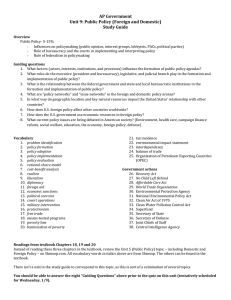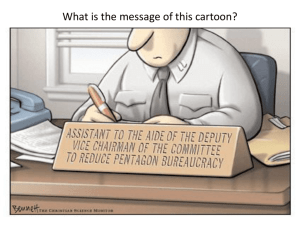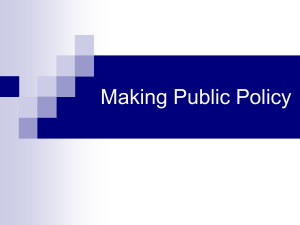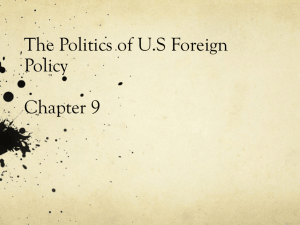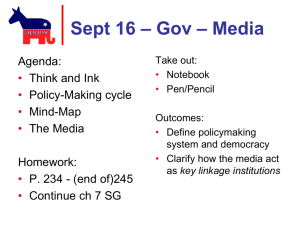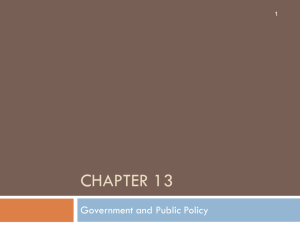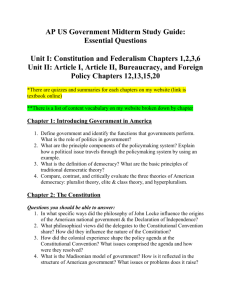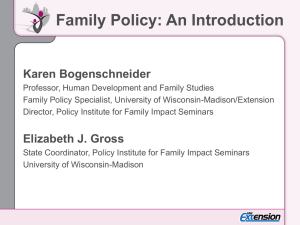AP U.S. Government & Politics Unit 8: The Federal Budget and
advertisement
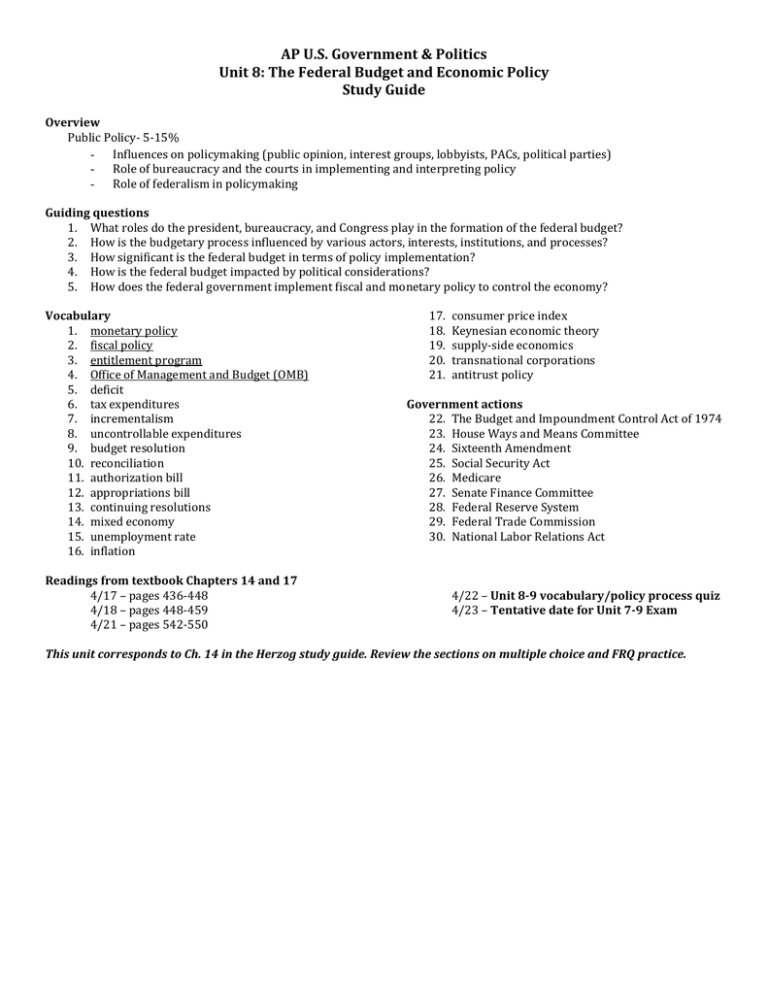
AP U.S. Government & Politics Unit 8: The Federal Budget and Economic Policy Study Guide Overview Public Policy- 5-15% - Influences on policymaking (public opinion, interest groups, lobbyists, PACs, political parties) - Role of bureaucracy and the courts in implementing and interpreting policy - Role of federalism in policymaking Guiding questions 1. What roles do the president, bureaucracy, and Congress play in the formation of the federal budget? 2. How is the budgetary process influenced by various actors, interests, institutions, and processes? 3. How significant is the federal budget in terms of policy implementation? 4. How is the federal budget impacted by political considerations? 5. How does the federal government implement fiscal and monetary policy to control the economy? Vocabulary 1. monetary policy 2. fiscal policy 3. entitlement program 4. Office of Management and Budget (OMB) 5. deficit 6. tax expenditures 7. incrementalism 8. uncontrollable expenditures 9. budget resolution 10. reconciliation 11. authorization bill 12. appropriations bill 13. continuing resolutions 14. mixed economy 15. unemployment rate 16. inflation Readings from textbook Chapters 14 and 17 4/17 – pages 436-448 4/18 – pages 448-459 4/21 – pages 542-550 17. 18. 19. 20. 21. consumer price index Keynesian economic theory supply-side economics transnational corporations antitrust policy Government actions 22. The Budget and Impoundment Control Act of 1974 23. House Ways and Means Committee 24. Sixteenth Amendment 25. Social Security Act 26. Medicare 27. Senate Finance Committee 28. Federal Reserve System 29. Federal Trade Commission 30. National Labor Relations Act 4/22 – Unit 8-9 vocabulary/policy process quiz 4/23 – Tentative date for Unit 7-9 Exam This unit corresponds to Ch. 14 in the Herzog study guide. Review the sections on multiple choice and FRQ practice. AP U.S. Government & Politics Unit 9: Public Policy (Foreign and Domestic) Study Guide Overview Public Policy- 5-15% - Influences on policymaking (public opinion, interest groups, lobbyists, PACs, political parties) - Role of bureaucracy and the courts in implementing and interpreting policy - Role of federalism in policymaking Guiding questions 1. What factors (actors, interests, institutions, and processes) influence the formation of public policy agendas including the impact of politics and the role of federalism? 2. What are “policy networks” and “issue networks” in the foreign and domestic policy arenas? 3. In what way do geographic location and key natural resources impact the United States’ relationship with other countries? 4. How does U.S. foreign policy affect other countries worldwide? 5. How does the U.S. government use economic resources in foreign policy? 6. Examine the policymaking and implementation process, including the role of three branches of the federal government and the bureaucracy. 7. What is the relationship between the federal government and state and local bureaucratic institutions in the formation and implementation of public policy? 8. What current policy issues are being debated in American society (such as the environment, health care, foreign policy, defense, social welfare, and economics)? Vocabulary 31. problem identification 32. policy formation 33. policy adoption 34. policy implementation 35. policy evaluation 36. rational choice model 37. cost-benefit analysis 38. realism 39. liberalism 40. diplomacy 41. foreign aid 42. economic sanctions 43. political coercion 44. covert operations 45. military intervention 46. protectionism 47. free trade 48. means-tested programs 49. poverty line 50. feminization of poverty 51. 52. 53. 54. 55. tax incidence environmental impact statement interdependency balance of trade Organization of Petroleum Exporting Countries (OPEC) Government actions 56. Recovery Act 57. No Child Left Behind 58. Affordable Care Act 59. World Trade Organization 60. Environmental Protection Agency 61. National Environmental Policy Act 62. Clean Air Act of 1970 63. Clean Water Pollution Control Act 64. Superfund 65. Secretary of State 66. Secretary of Defense 67. Joint Chiefs of Staff 68. Central Intelligence Agency Readings from textbook Chapters 18, 19 and 20 Instead of reading these three chapters in the textbook, review the Unit 5 (Public Policy) topic – including Domestic and Foreign Policy – on Shmoop.com. All vocabulary words in italics above are from Shmoop. The others can be found in the textbook. This unit corresponds to Ch. 14 in the Herzog study guide. Review the sections on multiple choice and FRQ practice. 4/22 – Unit 8-9 vocabulary quiz 4/23 – Unit 7-9 Exam (tentative)
